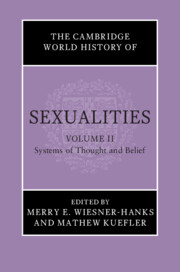Book contents
- The Cambridge World History of Sexualities
- The Cambridge World History of Sexualities
- The Cambridge World History of Sexualities
- Copyright page
- Contents
- Figures in Volume II
- Contributors to Volume II
- Editors’ Preface to the Series
- 1 Human Sexuality: The Evolutionary Legacy of Mating, Parenting, and Family Formation
- 2 Sexuality in Ancient Egypt: Pleasures, Desires, Norms, and Representations
- 3 Sexuality in the Systems of Thought and Belief of the Ancient Near East
- 4 Sexuality in Traditional South Asian Systems of Thought and Belief
- 5 Discourses of Desire in Ancient Greece and Rome
- 6 Writing a History of Sexuality for Pre-Modern China
- 7 Sexuality in Traditional Systems of Thought and Belief in Pre-modern Japan
- 8 African Traditions of Sexualities
- 9 Sexuality in the Traditional Systems of Thought and Belief of the Americas
- 10 Oceanic Sexualities: Persistence, Change, Resistance
- 11 Sexuality in Buddhist Traditions
- 12 Sexuality in Jewish Traditions
- 13 Sexuality in Christian Traditions
- 14 Sexuality in Islamic Traditions
- 15 Scientific Sex in the Modern World
- 16 Sexuality in Marxism and Socialism
- 17 Feminism and Modern Sexuality
- 18 Post-Colonialism and Sexuality
- Index
- Contents to Volumes I, III, and IV
- References
6 - Writing a History of Sexuality for Pre-Modern China
Published online by Cambridge University Press: 26 April 2024
- The Cambridge World History of Sexualities
- The Cambridge World History of Sexualities
- The Cambridge World History of Sexualities
- Copyright page
- Contents
- Figures in Volume II
- Contributors to Volume II
- Editors’ Preface to the Series
- 1 Human Sexuality: The Evolutionary Legacy of Mating, Parenting, and Family Formation
- 2 Sexuality in Ancient Egypt: Pleasures, Desires, Norms, and Representations
- 3 Sexuality in the Systems of Thought and Belief of the Ancient Near East
- 4 Sexuality in Traditional South Asian Systems of Thought and Belief
- 5 Discourses of Desire in Ancient Greece and Rome
- 6 Writing a History of Sexuality for Pre-Modern China
- 7 Sexuality in Traditional Systems of Thought and Belief in Pre-modern Japan
- 8 African Traditions of Sexualities
- 9 Sexuality in the Traditional Systems of Thought and Belief of the Americas
- 10 Oceanic Sexualities: Persistence, Change, Resistance
- 11 Sexuality in Buddhist Traditions
- 12 Sexuality in Jewish Traditions
- 13 Sexuality in Christian Traditions
- 14 Sexuality in Islamic Traditions
- 15 Scientific Sex in the Modern World
- 16 Sexuality in Marxism and Socialism
- 17 Feminism and Modern Sexuality
- 18 Post-Colonialism and Sexuality
- Index
- Contents to Volumes I, III, and IV
- References
Summary
This chapter begins with a discussion of the terminology and conceptual frameworks that are useful for contextualizing pre-modern Chinese sources about sex and sexuality. It then surveys several well-studied institutions and practices, including sex manuals, concubinage, female chastity, illicit sex, and literary representations of homoeroticism. The second half of the chapter reflects on three phenomena in works on the history of sexuality in pre-modern China, namely retrospective sexology, the censorship hypothesis, and the assumption of sex as a given. The author argues that while historians now no longer characterize sex culture in ancient China as either ‘liberated’ or ‘repressed’, as old sexologists did, we still tend to assume that the history of sexuality should primarily be about sexual practice and behaviour, despite the acknowledged lack of sources. The lack of sources, in turn, is often assumed to be the result of political and ideological censorship. More attention is needed to questioning scholars’ definition of the very subject matter, sex. The chapter concludes with a short review of scholarly approaches to comparing China with other cultures and a proposal of the ways in which a comparative history of sexuality can be productive.
- Type
- Chapter
- Information
- The Cambridge World History of Sexualities , pp. 114 - 135Publisher: Cambridge University PressPrint publication year: 2024

